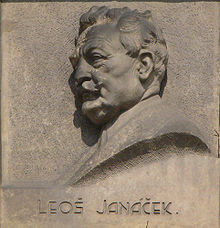- Destiny (Janáček)
-
Leoš Janáček  Operas
Operas- Šárka (1887)
- The Beginning of a Romance (1894)
- Jenůfa (1904)
- Osud (1907)
- The Excursions of Mr. Brouček to
the Moon and to the 15th Century (1920) - Káťa Kabanová (1921)
- The Cunning Little Vixen (1924)
- The Makropulos Affair (1926)
- From the House of the Dead (1930)
Destiny (also known as Fate, Czech: Osud) is an opera in three acts by Leoš Janáček to a Czech libretto by the composer and Fedora Bartošová. Janáček began the work in 1903 and completed it in 1907. The inspiration for the opera came from a visit by Janáček in the summer of 1903, after the death of his daughter Olga, to the spa at Luhačovice. There, Janáček met Kamila Urválková, who had been the subject of an opera by Ludvík Čelanský, Kamila, where she felt that Čelanský had falsely depicted her personality. After learning that Janáček was a composer, Urválková persuaded Janáček to write another opera to counteract Čelanský's portrait of her.[1]
Janáček submitted the opera to the Brno Theatre in 1906, and to the Vinohrady Theatre in Prague in 1907, but both theatres rejected the score. The score stayed with the Vinohrady Theatre even after Janáček had threatened lawsuits against the theatre and after the Brno theatre made offers of a possible production.[1]
The work did not receive a hearing until after Janáček's death, in 1934 on Brno Radio.
Contents
Performance history
The first staging was in 1958 in Brno, conducted by František Jílek, as part of the 1958 Janáček Festival in commemoration of the 30th anniversary of Janáček's death.[2]
However, the structure of the plot was altered from the original to give the story a "flashback" format, where the story begins with Act 3 and interpolates Act 1 and Act 2 as the "flashbacks", before returning to finish Act 3.[1]
The first UK staging was in 1984 at English National Opera, in a translation by David Poutney, but with Janáček's original plot structure intact. The first US production was in July 2003 at the Bard Summerscape Festival.[3] Scholars have criticised weaknesses in the plot as the reason for the opera's neglect.[4]
Roles
Role Voice type Premiere Cast,
first staging in Brno,
25 October 1958
(Conductor:František Jílek)Míla Valková soprano Jindra Pokorná Živný, a composer tenor Jaroslav Ulrych Míla's Mother soprano Dr. Suda tenor First Lady soprano Second Lady soprano Old Slovak Woman soprano Councillor's Wife soprano Lhotský, a painter baritone Konečký baritone Miss Stuhlá, a teacher mezzo-soprano Miss Pacovská soprano Synopsis
Act 1
Míla and the composer Živný were once lovers, but Míla’s mother ended the relationship in hopes of a more advantageous match for her daughter. Alas, Míla was already pregnant and is now a single mother, unlikely to marry anyone else. She and Živný meet again for the first time amid the amusements of a spa town. They sneak off together and rekindle their love, but her mother tracks them down in the crowd and predicts disaster.
Act 2
Four years later Živný and Míla are married, but her mother lives with them and has become mentally fragile. While their young son Doubek plays, the couple read through the unfinished opera Živný began during their separation. It is filled with bitterness against Míla, portraying her as faithless. Míla’s mother, losing her mind completely, repeats snatches of music from the opera before rushing to throw herself off a balcony. Attempting to restrain her mother, Míla too is pulled over, and both are killed.
Act 3
Eleven years later, Živný’s opera is at last to be performed, although it remains unfinished. He rehearses a chorus from the opera with his students, among them Doubek, now a young man. Another student, Verva, guesses that the hero of the opera is the composer himself. Through the music, Živný again relives his love for Míla and his cruelty to her. Tormented by regret, he asks Doubek to fetch a glass of water and then collapses. The end of the opera must remain in God’s hands.
Recordings
- Supraphon SU 0045-2 611: Jarmila Palivcová, Jindřich Doubek, Jindřich Doubek, Daniela Suryová, Marie Steinerová, Vilém Přibyl, Josef Škrobánek, Vladimír Krejčík, Jiří Holešovský, Antonín Jurečka, Jiří Olejníček, Jaroslav Souček, Richard Novák, František Caban, Anna Barová, Jaroslava Janská, Jarmila Hladíková, Jindra Pokorná, Jarmila Krátká, Zdenka Kareninová, Milena Jílková, Magdaléna Hajóssyová, Magda Polášková; Brno Janáček Opera Orchestra and Chorus; František Jílek, conductor[5]
- Orfeo C 384 951 A: Peter Straka, Lívia Ághová, Marta Beňačková, Štefan Margita, Peter Mikuláš, Ivan Kusnjer, Ludmila Nováková-Vernerová, Martina Straková, Věra Přibylová, Lubomír Moravec, Richard Sporka, Lenka Kučerová, Vladimír Nacházel, Eva Zbytovská; Prague Chamber Choir, Chorus Masters Josef Pančík; Czech Philharmonic Orchestra, Gerd Albrecht, conductor (live recording 1995)
- Chandos CHAN3029 (sung in English): Helen Field, Philip Langridge, Kathryn Harries, Peter Bronder, Stuart Kale, Barry Mora, Christine Teare, Elizabeth Gaskell, Dorothy Hood, Catroina Bell, Mark Holland, Rebecca Moseley-Morgan, Samuel Linay, Michael Preston-Roberts, Yolande Jones, Cheryl Edwards, Mary Davies, Gaynor Keeble, Gareth Rhys-Davies, Philip Lloyd-Evans, Ralph Mason, Timothy German, Frances Manning; Welsh National Opera Orchestra and Chorus; Sir Charles Mackerras, conductor[6]
References
- Notes
- ^ a b c Tyrrell, John, "Janáček's Fate" (January 1972). The Musical Times, 113 (1547): pp. 34-37.
- ^ Amis, John, "Reports from Abroad: Janáček Festival at Brno" (December 1958). The Musical Times, 99 (1390): pp. 674-676.
- ^ Anne Midgette (2003-07-29). "Janacek's Search For Art In Real Life". New York Times. http://query.nytimes.com/gst/fullpage.html?res=9B0DE4DD1F3FF93AA15754C0A9659C8B63&sec=&spon=&pagewanted=all. Retrieved 2008-05-01.
- ^ Hinton, Stephen, "First Performances: Osud" (December 1984). Tempo (New Ser.), 151: pp. 52-53.
- ^ Tyrrell, John, Review of recording of Osud (Fate) (1981). The Musical Times, 122 (1663): p. 608
- ^ McKee, David (1992). "Osud. Leoš Janáček". The Opera Quarterly 9 (2): 156–159. doi:10.1093/oq/9.2.156. http://oq.oxfordjournals.org/cgi/reprint/9/2/156. Retrieved 2008-01-01.
- Sources
- Tyrrell, John, "Osud" in New Grove Dictionary of Opera, Ed. Stanley Sadie, London, 1992 ISBN 0-333-73432-7
External Links
Categories:- Czech-language operas
- Operas by Leoš Janáček
- Operas
- 1907 operas
- 1934 operas
Wikimedia Foundation. 2010.
